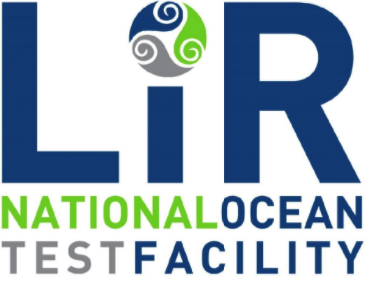
Lir National Ocean TF

- Contact
- Title
-
Operations Co-Ordinator
- Tel
-
+353 (0)21 486 4310
Description
Lir – the National Ocean Test Facility provides world-class laboratory testing for offshore wind, wave and tidal energy devices. The facilities at Lir include four wave tanks that can replicate real ocean conditions and enable testing of various marine innovations, technologies and structures at different scales. As well as the ocean test infrastructure, Lir also offers a highly experienced team of researchers and operators.
Specification
Open Ocean Emulator (25m x 18m x 1m deep): Used for testing a variety of marine structures, such as: wave energy convertors, floating wind platforms, coastal structures, oil and gas platforms. It has a central section with a depth of 2.5m to assist in the testing of mooring lines.
Deep Ocean Basin (35m x 12m x 3m deep): It has a moveable floor plate to allow the water depth to be adjusted, making it suitable for circa. 1/15th scale operational conditions and 1/50th scale survival waves. Equipped with 16 hinged force feedback paddles capable of a peak wave 1.1m in height.
Wave and current flume (28m x 3m x 1m deep): A multi-purpose facility with the capability of running separate and combined unidirectional wave and current tests. It has 8 hinged force feedback paddles and three thrusters for generating current speeds of greater than 1 m/s and it is fitted with a towing carriage that can operate at speeds up to 1.5 m/s.
Electrical laboratory: A dual-bus three phase 400V system consisting of generation, storage, and load elements. It can operate in parallel with the local grid or as an islanded system. Several and varied range of motor options for turbine testing along with a separate fry lab facility for testing of permeable items
Services
Services currently offered by Lir to third-party developers include access to the tank hall for device testing together with a range of the following services:
- Device testing
- Component testing (linear and rotary rigs and a micro-grid)
- Hydrodynamic Performance in a range of conditions
- Power take-off performance
- Site specific wave generation
- Naval architecture in terms of motions, weight distribution, balance and stability
- Mooring, influence and loading
- Validation of numerical models
- Data acquisition and analysis through bespoke software
- Power matrix production
During the testing process, support will be offered by highly-skilled personnel, including the following services:
- Mechanical and electrical technical support to assist in setting up projects and instrumentation
- Tank operation support by experienced Lir personnel, including guidance on testing schedule optimisation
- Desk space and internet access
- Assistance on logistical issues, including local accommodation and transport





